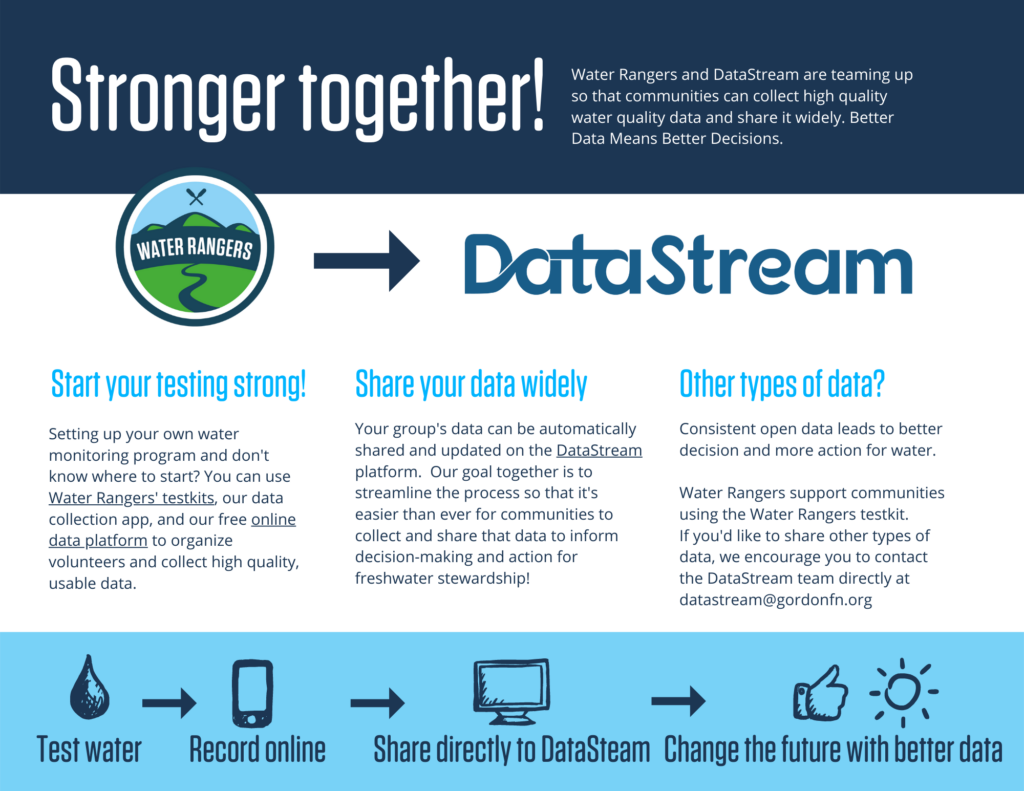Data management best practices

The importance of good data management
Water Rangers is a leader in Community-based water monitoring (CBWM). Our mission is to provide the tools communities need to collect data about their local creeks, rivers, lakes, and coasts in order to know the health of their waterways. Good data management practices are a crucial part of CBWM. To this end Water Rangers created a web app and field data collection app to ensure these important data points have a digital home, and that our datasets are available for use and reuse in an open, accessible, and machine readable way.
Water Rangers aspires to lead by example and promote the use of FAIR data principles (data that is Findable, Accessible, Interoperable and Reusable). This is why we’ve invested in the design of data management system that follows.
Our data standard
By ensuring community-based water monitoring (CBWM) data is collected, managed, and shared in accordance with this international standard we better adhere to best practices, and further the reach and use of community science data.
In 2022, Water Rangers was the recipient of a Research Data Alliance of Canada’s Data Champions grant. Water Rangers’ alignment to the WQX data standard draws on work supported by the Digital Research Alliance of Canada. Through 2022 Water Rangers worked to update our existing data structure to be in line with the WQX standard for the Exchange of Water Quality Data. Our goal here is to ensure consistent formatting of water data and to avoid ambiguous or missing information.
The WQX standard for the Exchange of Water Quality Data was developed by the US Environmental Protection Agency (EPA) and the US Geological Society (USGS). WQX uses the standards of the National Environmental Information Exchange Network. The WQX schema is a standard set of data formats that specify the data elements and data structure required for submission of data to EPA.
Water Rangers’ collaborator, the Gordon Foundation, also adopted this water quality standard in DataStream’s WQX Open Data Schema (DS-WQX). As Water Rangers and DataStream collaborate on a data sharing automation it is imperative our data structures are aligned.

The value of your data
In the simplest terms, the raw materials generated by individuals and community-based water monitoring groups are the data and information products. This data that would not have existed if CBWM groups like yours hadn’t collected them. This data is very valuable, filling information gaps and helping inform action and sound decision making.
100 of Canada’s 167 sub-watersheds lack sufficient data to report on their health.
WWF-Canada, 2020
Community-based water monitoring is a cost-effective and scientifically rigorous way for Canadians to collect data on the quality of fresh and marine water across watersheds. According to the Institute of Sustainable Development’s Business Case for Investment in Canadian Community-Based Water Monitoring, CBWM is a cost-effective (>3:1) and scientifically rigorous method to collect medium and long-term water quality monitoring data at the watershed scale.
Take care of your data
It is critical that the data community based water monitoring groups collect is well managed. This means ensuring that your data makes off your notepads and into a digital data platform, where is can be managed, accessed, and shared in a format that everyone can use. In other words, that it is interoperable.
Click here for instructions on sharing your data
Our collaborators in data management
Pulling together a mosaic of community datasets to tackle water quality problems on a regional scale is difficult. The collaboration between DataStream and Water Rangers addresses this.
DataStream is an online, open-access platform for sharing water quality data that allows water monitors to standardize, store, and share their data. Anyone can explore, visualize and download the data. DataStream was developed by The Gordon Foundation and is delivered in collaboration with regional monitoring networks.

In 2021, DataStream expanded into the Great Lakes region. This presented new opportunities for collaborating with Water Rangers. Water Rangers creates accessible water-quality monitoring and data collection tools so that communities have a voice in protecting their waterways.
Now, through a new hub-to-hub connection, anyone in the Water Rangers network can share data on Great Lakes DataStream, Lake Winnipeg DataStream, Mackenzie DataStream, Atlantic DataStream and the soon to be released Pacific DataStream.
By working collaboratively, our goal is to reduce barriers so that communities can share that data to inform decision-making and action for freshwater stewardship.
Interested in sharing your data to DataStream? Opt-in via your Water Rangers’ account and we’ll get you set up.
Read more by downloading our white paper, Growing The Flow.